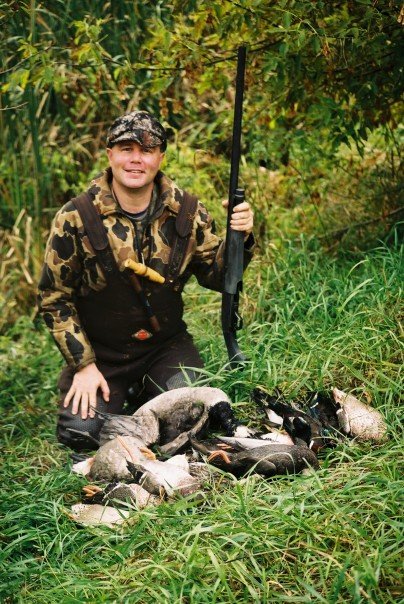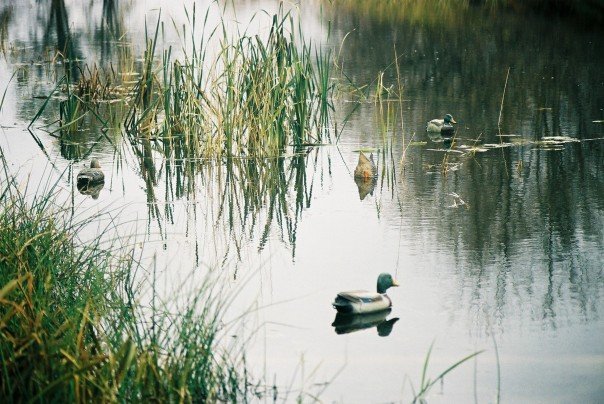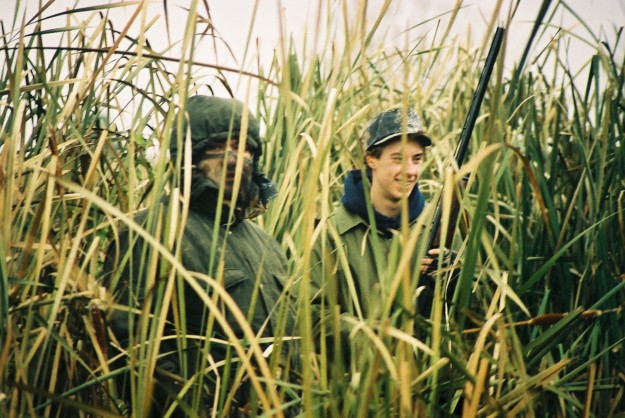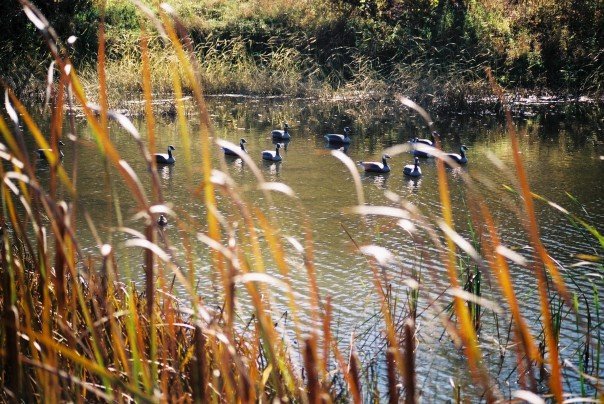
A mixed bag of mallards, wood ducks and a Canada goose taken on a morning hunt on the Castor River.
“All that glisters is not gold,” William Shakespeare got that right when he coined this adage. I recalled this adage this week after a duck hunt on the Castor River. In seasons past, the stretch of the Castor River that runs through a farm outside Russell, Ontario was a honey hole for my duck hunting buddies and me. Seasons ago we had exciting puddle duck hunting. We shot Canada geese on the river too. Occasionally, passing flocks of Canada geese or singles offered passing shots. We had great roost shoots back in the day when Canada geese used the river to roost. Mallards and wood ducks were the most common species of wild duck we shot on the river–though once I bagged a hooded merganser. In more recent seasons, ducks are few and far between. For whatever reason, ducks are not using this stretch of the Castor River. Neither are Canada geese roosting on the river. Imagine my surprise and delight when I drove out to the farm to take a look at the river and found wood ducks and Canada geese sitting on the water. A mallard drake flew along the river, well within shotgun range. “Could it be,” I thought, “that the river is attracting waterfowl again?”
I decided to mount a solo duck hunt on the river the following morning. I loaded my Jeep with decoys, chest waders, folding seat, camouflage netting, and hunting bucket filled with gun cleaning supplies, my first aid kit, duck and goose calls, and snacks the night before setting out for the farm. I do this to save time. I got up at 3:30 am, had a quick breakfast, gathered my Browning BPS pump shotgun, shells and set out for the farm at 4:00 am. Shooting time started at 6:40 am. I like to give myself ample time to set out my decoys and get in position before legal shooting time begins. I stopped at a Tim Hortons on my way to the farm to fill my thermos with hot, black coffee. I arrived at the farm at about 4:45 am. I got to work right away, lugging my decoys and the rest of my gear to the river’s edge. I noticed right away that no Canada geese were roosting on the river. No matter, I got into my waders and carefully dragged my decoy bag filled with one dozen black and mallard decoys out into the spot on the river I selected for my morning hunt.

A typical decoy spread on the Castor River.
With eleven decoys set–the anchor was detached from the remaining decoy–I carefully placed the folding seat in the cattails overlooking my decoy spread. I bought the folding seat the weekend before at Sail. The seat has a backrest. I found this made me much more comfortable as I sat in the cattails. With the seat in place, I retrieved my shotgun and shells and thermos and waded back to take my place in the cattails. I tried to adjust my hat as I waded and succeeded in knocking my Dollar Store headlamp off my hat into the river. The light shone on bravely at the bottom of the river until the water finally shorted out the lamp. I found my way to my seat in the dark and got into position. I had forty minutes until shooting time; time enough to have a hot cup of coffee and reminisce about duck hunts I had in seasons past.
Two young friends, Omer and Eric, who were new to duck hunting first took me to the Castor River back in the early 2000s. I cannot remember the exact date, just that it was the morning we went off daylight savings time. Omer called me asking where I was as he and Eric forgot to turn back their clocks. Despite this mix-up, we got into birds that morning and shot three ducks between us.

Omer and Eric duck hunting on the Castor River.
In the years following my first hunt on the Castor River my hunting buddies and I had excellent duck and goose hunting. The most exciting hunts we enjoyed were the roost shoots for Canada geese. The first time I went for a roost shoot for Canada geese was in 2011 with my friend Jason and his dog Nos. Having a retriever made an afternoon hunt on the river feasible. I avoid afternoon waterfowl hunts unless a retriever is present. It is hard enough finding downed birds in daylight. Searching for downed birds in the last half hour after sunset without a dog is not worth the risk in my humble opinion. The first roost shoot on the river with Jason and his dog Nos was a glaring success. I put a few of my goose floaters on the river and geese came winging in without hesitation.

Canada goose decoys floating on the Castor river.
We limited out in no time. We found the geese gorged on corn as Jason observed in a brief video I recorded.
While I sat in the dark, sipping my cup of coffee, waiting for legal shooting time, a heron flew past. “Ah,” I thought, “a heron on a duck marsh is a good omen according to local lore.” Though I am not superstitious, it gives me a boost when I find a heron in a duck marsh. Finally, shooting time arrived, and I loaded my BPS. I know ducks do not wear watches, but I find the first half hour of shooting time is often the best. The minutes ticked by and I heard the calls of songbirds starting their day. As I watched the sky from both ends of the stretch of river I watched, a single wood duck appeared. The duck offered me a passing shot, winging past from my left side. I raised my shotgun, but my thumb slipped on the safety catch, so when I slapped the trigger, the gun did not fire. The duck sped away unharmed.
A short time later a flock of wood ducks decoyed, winging in from the same direction as the single. I fired once and downed a nice drake. The downed bird looked dead on the water, and I watched as it drifted into the cattails to the left of my position. I thought about leaving the downed bird until after I concluded my morning hunt. I did not want to get caught out in the open of more birds were forthcoming. After a few minutes, I decided I better retrieve the downed bird. I waded to the spot I last saw the bird and found nothing. I searched, and it was as if the river swallowed the bird; I did not see it. Disappointed, I made my way back to my seat and continued watching the skies, anticipating more flights of birds.
Unfortunately, my hopes were dashed when nothing but another heron, blackbirds and a marsh wren came by the rest of the morning. In the fortunes of waterfowling, it looks as though the ducks and Canada geese I spotted on the river the day before was a fluke. Yes, “all that glisters is not gold.” Not only that, I noticed there were far fewer Canada geese in the air than I usually see at this stage of the season. I am not sure if the northern birds are not in yet or if they already came and went. Regardless, the sad reality is the Castor River does not attract ducks and geese the way it did in seasons past. I picked up my decoys at 9:00 am. When I picked up my folding seat and shotgun shells, I found my waterproof shotgun shell box somehow had water seep in. I drained the water from the box and dried off the shells. I think the shells survived the damp, but this was the crowning event on a morning duck hunt that did not go as I hoped.
One disappointing duck hunt is not going to deter me from trying my luck. I will get out after ducks and geese before the season ends. I will try my luck on the Rideau and the Tay Rivers next and see what fortune brings.
Posted by Geoffrey

We can hunt ducks and geese on the Rideau? I thought it was all off limits.
I’d love to come along so time if you are looking for company. I have the license / permits for Ontario and migratory.
Hi Robin, Thank you for commenting. Could you tell me a little more about yourself? Tell me a little more about your interest in hunting. You can contact me by the email address posted on the blog.